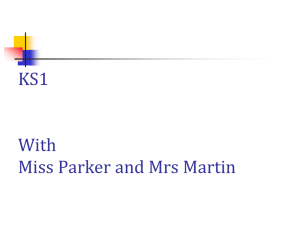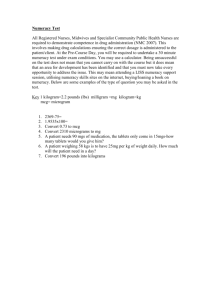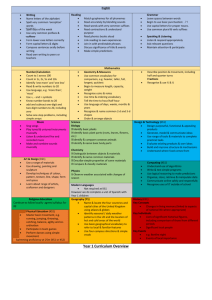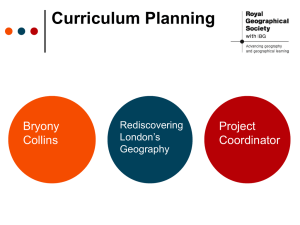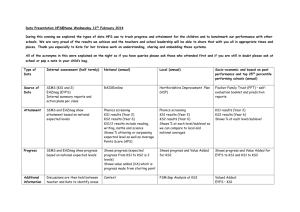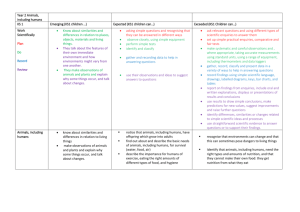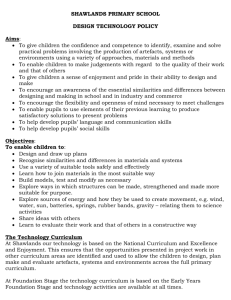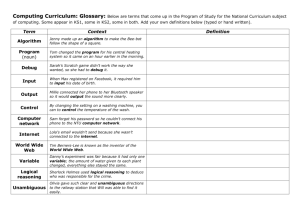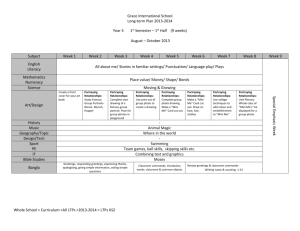Click here - St Nicholas
advertisement
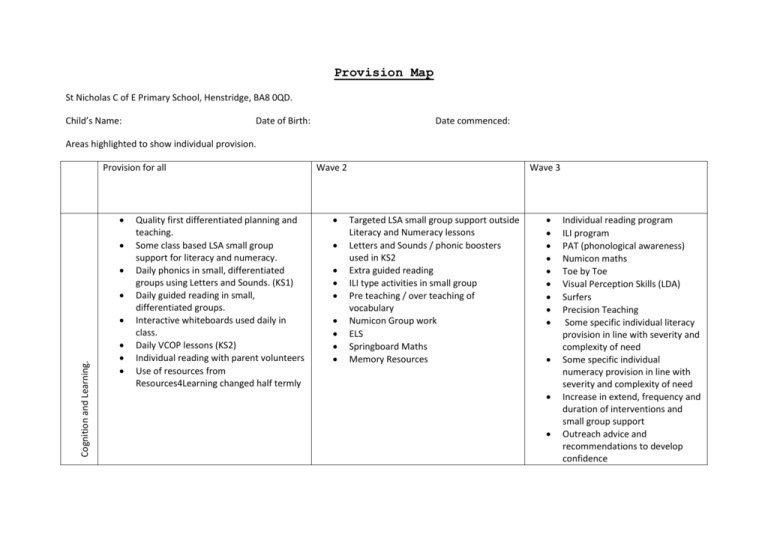
Provision Map St Nicholas C of E Primary School, Henstridge, BA8 0QD. Child’s Name: Date of Birth: Date commenced: Areas highlighted to show individual provision. Provision for all Cognition and Learning. Quality first differentiated planning and teaching. Some class based LSA small group support for literacy and numeracy. Daily phonics in small, differentiated groups using Letters and Sounds. (KS1) Daily guided reading in small, differentiated groups. Interactive whiteboards used daily in class. Daily VCOP lessons (KS2) Individual reading with parent volunteers Use of resources from Resources4Learning changed half termly Wave 2 Wave 3 Targeted LSA small group support outside Literacy and Numeracy lessons Letters and Sounds / phonic boosters used in KS2 Extra guided reading ILI type activities in small group Pre teaching / over teaching of vocabulary Numicon Group work ELS Springboard Maths Memory Resources Individual reading program ILI program PAT (phonological awareness) Numicon maths Toe by Toe Visual Perception Skills (LDA) Surfers Precision Teaching Some specific individual literacy provision in line with severity and complexity of need Some specific individual numeracy provision in line with severity and complexity of need Increase in extend, frequency and duration of interventions and small group support Outreach advice and recommendations to develop confidence Communication and interaction Somerset Total Communication Environment Drama and role play activities as part of lessons. Parental celebration assemblies. Daily reading record signed and commented in by parents. Oxford Owl e-books. Computer suite and laptops. Bee bot Visual timetable Yearly report to parents Weekly homework Varied assemblies daily lead by different adults and on different themes. Visitors into school Visits out of school Time to talk / socially speaking group Speech and Language Program – small group. Talking Partners Small group visual timetable Additional in class support from Class teacher or LSA Clicker 5 Social Stories Baseline communication Activities. Individual home/ school booklet sent home daily Individualised programs and resources for communication based on SALT advice Individual support for Social Stories Individual social interaction and communication support Specialised communication equipment Social, mental and emotional health Positive whole school ethos. Whole school behaviour policy Rewards and sanctions PSHE & Citizenship Curriculum SEAL Circle Time and Golden Time weekly Class Rules Golden Rules for the school Time out Removal of Activities such as Playtime. Extracurricular clubs Home school agreement signed annually. Socially Speaking Program Time to Talk Dealing with feelings program Pastoral support plans Behaviour sanctions Nurture sessions Extra support in class. Forest school Outside learning 101 games for social skills Additional support when needed Individual behaviour sanctions Play time monitoring Individual visual timetable Use of individual resources – worry beads etc. One to one support Individual program out of class Separate play times Separate seating arrangement Daily discussion with parents Home school book Parent support advisor involvement SEBBS involvement Circle of Friends Time out CAMHS program Support at break and lunch times Brain Gym Handwriting exercises Weekly PE lessons Swimming lessons (KS1 and KS2) Use of tyre park and trim trail Use of school field and playgrounds Use of school Learning Garden. Use of decking KS 1 classrooms. Welly Walks (KS1 and FS) Daily hand/eye co-ordinations activities – FS/KS1 sensory Sensory and physical Speed Up – Kinaesthetic handwriting program Targeted small group to develop coordination and movement Scissor skills activities Small group hand/eye co-ordination activities. Individualised programs based on OT advice Writing slope Individualised specialist equipment Support from school nurse Frequent input from outside agencies. Adapted PE lessons. Adapted equipment or areas in school. Seating at the front of the group. Individual Physiotherapy program. Individual Occupational Therapy Program. Access, review and assessment Groups structured by ability Collaborative learning Incorporation of all learning styles in daily lessons Pupil progress meetings Access to equipment needed National Curriculum Assessment – SATS Year one phonic screening Termly assessment in Reading, Writing, Numeracy and Science. Curricular Targets KS1 & 2. EYFS profile updated half termly APP in Reading, writing, numeracy and science. Discussed at Consultation Meeting Access to support services (for short term, indirect or direct intervention) Group IEP On current monitoring register for SEN IEP review meeting termly Individual assessment of needs, learning and behaviour (NARA, PhAB, BPVS etc) On SEN register Annual review meeting Frequent discussion with staff and parents Individual timetable and planning for intervention Individual Assessment by Support Services Common Assessment Framework (CAF) Statement of Educational Needs Consultation Meetings. Support Services input into planning, monitoring and reviewing IEPs and SA+ /Statements
